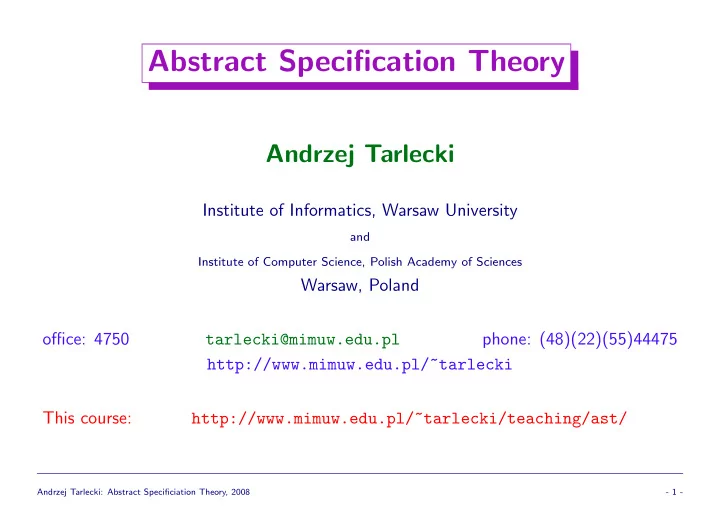

Abstract Specification Theory Andrzej Tarlecki Institute of Informatics, Warsaw University and Institute of Computer Science, Polish Academy of Sciences Warsaw, Poland office: 4750 phone: (48)(22)(55)44475 tarlecki@mimuw.edu.pl http://www.mimuw.edu.pl/~tarlecki This course: http://www.mimuw.edu.pl/~tarlecki/teaching/ast/ Andrzej Tarlecki: Abstract Specificiation Theory, 2008 - 1 -
Long-term goal A formal basis for systematic development of correct programs from requirements specifications by verified refinement steps . Andrzej Tarlecki: Abstract Specificiation Theory, 2008 - 2 -
Overall plan • Underlying logical framework: basic algebraic framework; first-order logic; institutions plus: category theory • Specifications: basic and structured specifications; proof systems for specifications • Program development: simple refinements; constructor refinements; local constructions in global refinement steps; architectural specifications • Observational approach: observational/behavioural interpretation of specifications, refinements, and architectural specifications; local correctness and stability • Heterogeneous specifications: maps between institutions; focused heterogeneous specifications; distributed heterogeneous specifications • All propped up by examples? Conclusions? Andrzej Tarlecki: Abstract Specificiation Theory, 2008 - 3 -
My proposal Let’s read together through: D.T. Sannella, A. Tarlecki Foundations of Algebraic Specifications and Formal Program Development Springer, forthcoming. Andrzej Tarlecki: Abstract Specificiation Theory, 2008 - 4 -
Contents • Chap. 0: Introduction • Chap. 1: Universal algebra • Chap. 2: Simple equational specifications • Chap. 3: Category theory • Chap. 4: Working within an arbitrary logical system • Chap. 5: Structured specifications • Chap. 6: Parameterisation • Chap. 7: Formal program development • Chap. 8: Behavioural specifications • Chap. 9: Proofs for specifications • Chap. 10: Working with multiple logical systems Andrzej Tarlecki: Abstract Specificiation Theory, 2008 - 5 -
Literature A rudimentary knowledge of basic concepts of universal algebra and category theory is expected. Plenty of standard textbooks But this will be roughly based on: • D.T. Sannella, A. Tarlecki. Foundations of Algebraic Specifications and Formal Program Development . Springer, forthcoming. − Chap. 1: Universal algebra − Chap. 2: Simple equational specifications − Chap. 3: Category theory • D. Sannella, A. Tarlecki. Algebraic preliminaries. In: Algebraic Foundations of System Specification , E. Astesiano, H.-J. Kreowski, B. Krieg-Br¨ uckner, eds., 13–30, Springer Verlag 1999. Andrzej Tarlecki: Abstract Specificiation Theory, 2008 - 6 -
The lectures will loosely follow the ideas presented in the following papers, which therefore should make a good background reading: • A. Tarlecki. Abstract specification theory: an overview. In: Models, Algebras, and Logics of Engineering Software , M. Broy, M. Pizka, eds., NATO Science Series - Computer and Systems Sciences, Vol. 191, 43–79, IOS Press, 2003. • D. Sannella, A. Tarlecki. Essential concepts of algebraic specification and program development. Formal Aspects of Computing 9(1997) 229–269. • M. Bidoit, D. Sannella, A. Tarlecki. Architectural specifications in CASL. Formal Aspects of Computing , 13 (2002), 252–273. • M. Bidoit, D. Sannella, A. Tarlecki. Global development via local observational construction steps. Proc. MFCS’02 , Springer LNCS 2420, 1–24, Springer-Verlag 2002. Andrzej Tarlecki: Abstract Specificiation Theory, 2008 - 7 -
CoFI pages, http://www.cofi.info/ , provide all the material on Casl and relate work. The following are not to be missed: • M. Bidoit, P.D. Mosses. Casl User Manual . Springer LNCS 2900 (IFIP Series), 2004. With chapters by T. Mossakowski, D. Sannella, and A. Tarlecki. • CoFI (The Common Framework Initiative). Casl Reference Manual . Springer LNCS 2960 (IFIP Series), 2004. Andrzej Tarlecki: Abstract Specificiation Theory, 2008 - 8 -
Institutions have been introduced in: • J. Goguen, R. Burstall. Institutions: abstract model theory for specification and programming. Journal of the Assoc. for Computing Machinery 39(1):95–146, 1992. The following book chapter provides an introduction to, motivation for, and some concepts and results built around this notion: • A. Tarlecki. Institutions: an abstract framework for formal specifications. In: Algebraic Foundations of System Specification , E. Astesiano, H.-J. Kreowski, B. Krieg-Br¨ uckner, eds., 105–130, Springer-Verlag 1999. See also http://www.mimuw.edu.pl/~tarlecki/marktoberdorf/ . Andrzej Tarlecki: Abstract Specificiation Theory, 2008 - 9 -
Universal algebra and category theory: basic ideas, notions and some results • Algebras, homomorphisms, equations: basic definitions and results • Categories; examples and simple cateogrical definitions • Limits and colimits • Functors and natural transformations • Adjunctions BUT: Tell me what you want to learn! Andrzej Tarlecki: Abstract Specificiation Theory, 2008 - 10 -
One motivation Software systems (modules, programs, databases. . . ): sets of data with operations on them • Disregarding: code, efficiency, robustness, reliability, . . . • Focusing on: CORRECTNESS Category theory Universal algebra from rough analogy A language to further abstract away from the standard notions of univer- module interface ❀ signature sal algebra, to deal with their numer- module ❀ algebra ous variants needed in foundations of module specification ❀ class of algebras computer science. Andrzej Tarlecki: Abstract Specificiation Theory, 2008 - 11 -
Recommend
More recommend